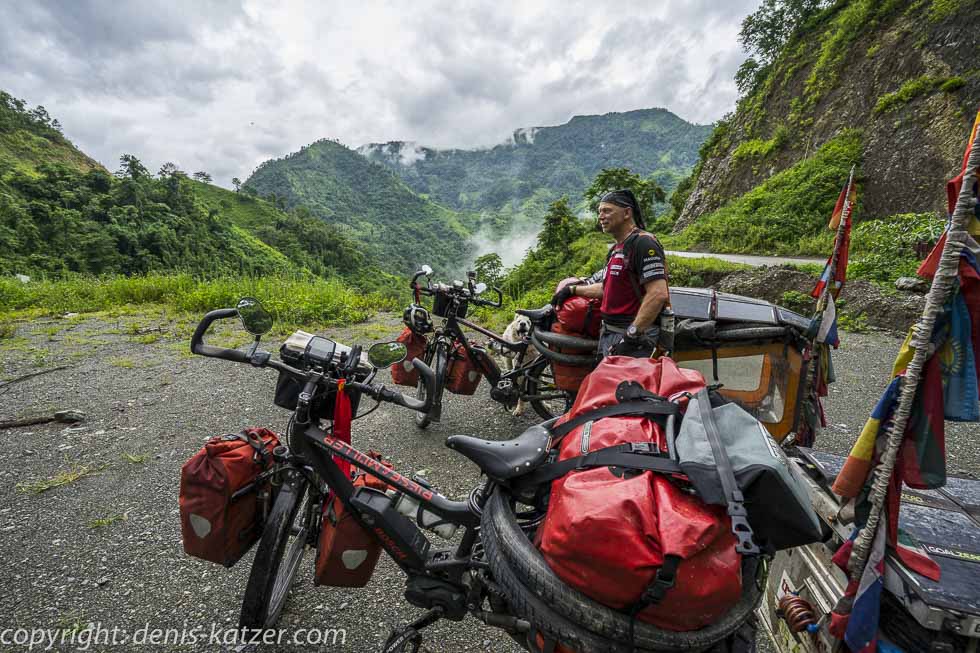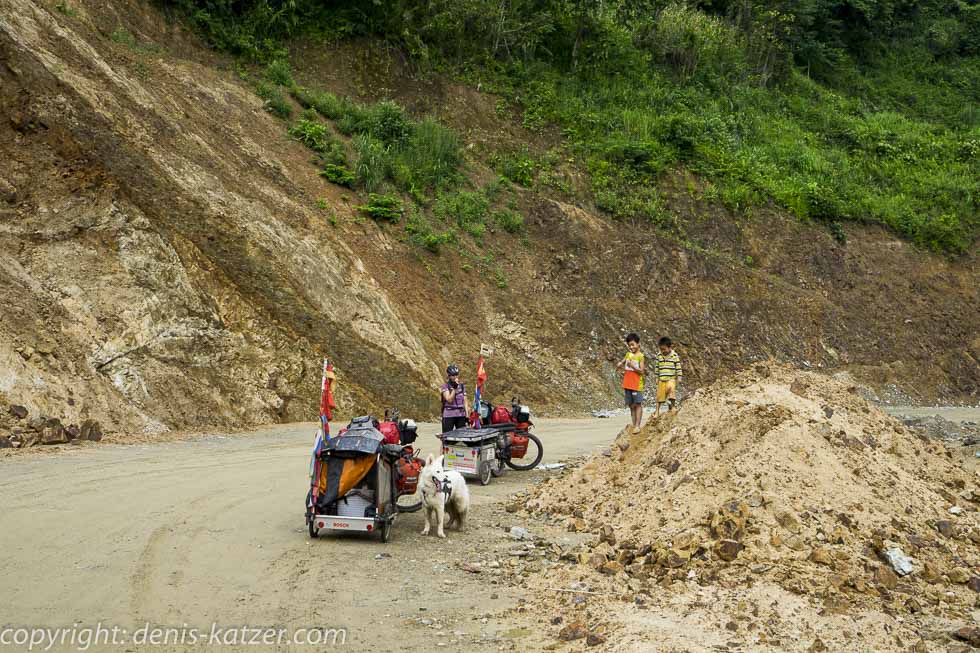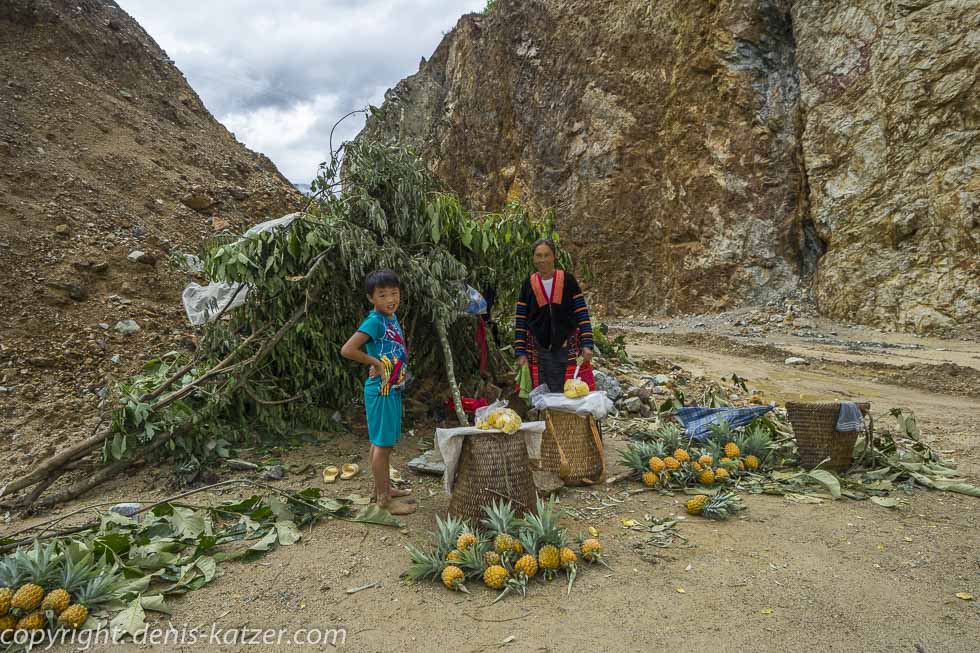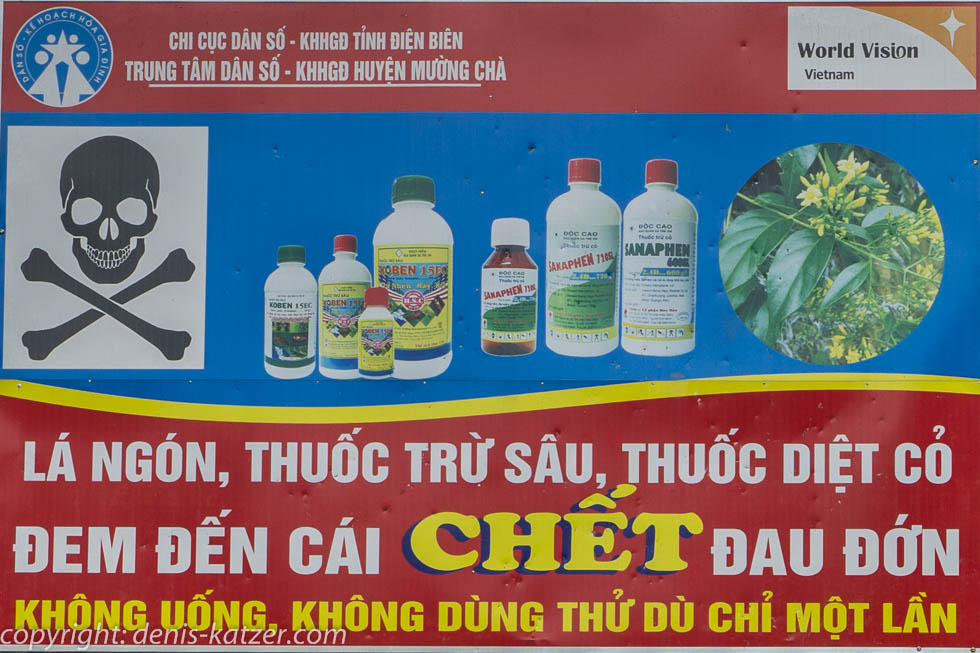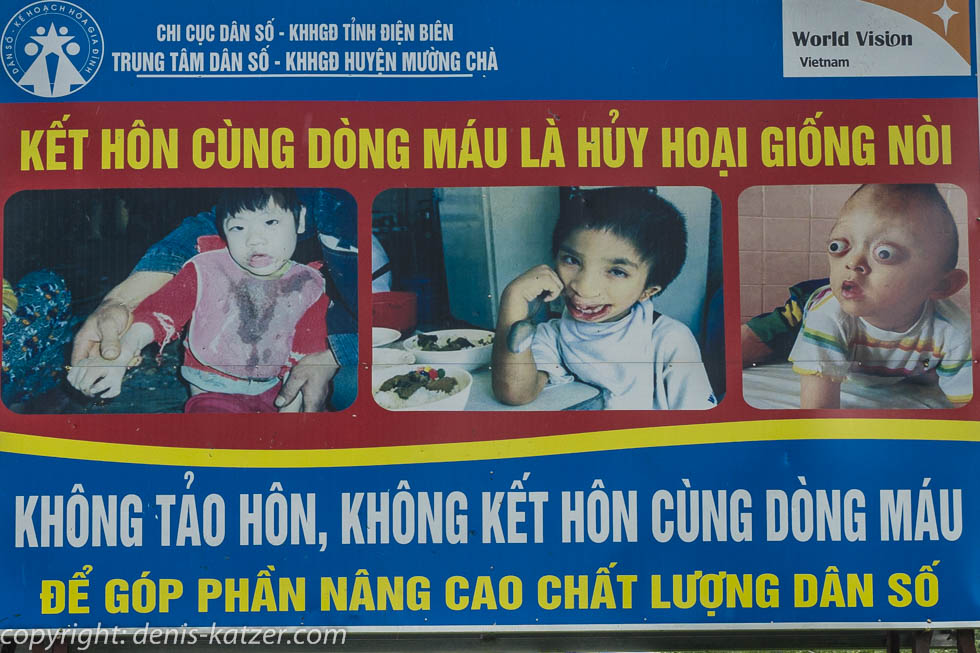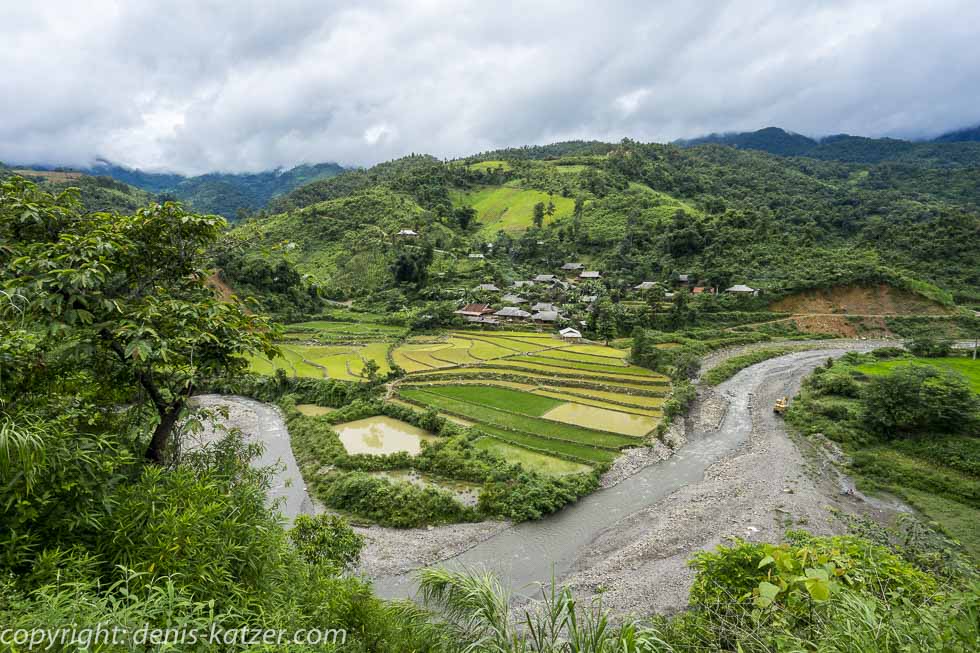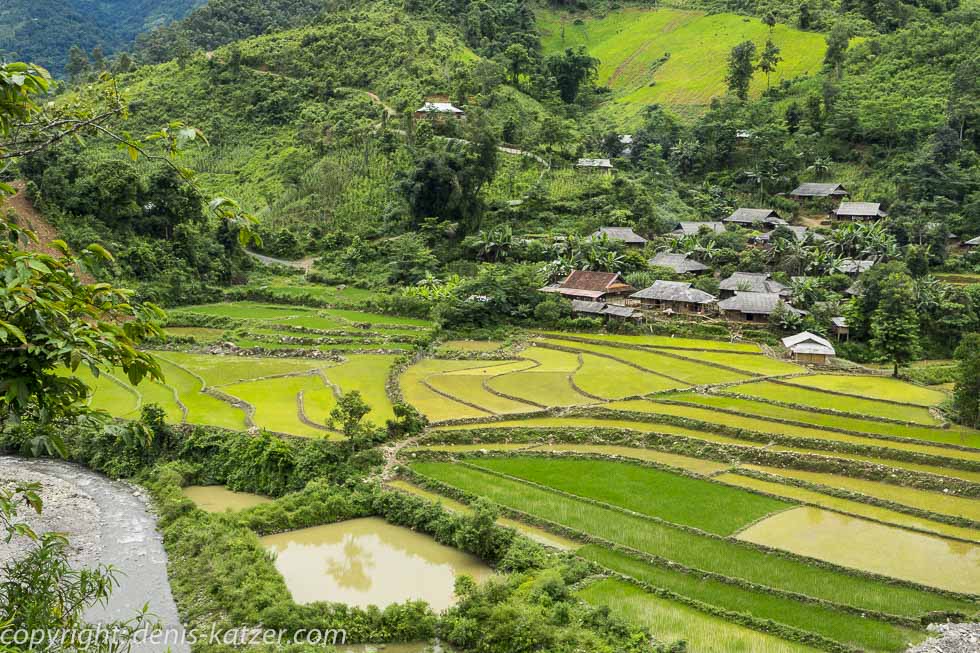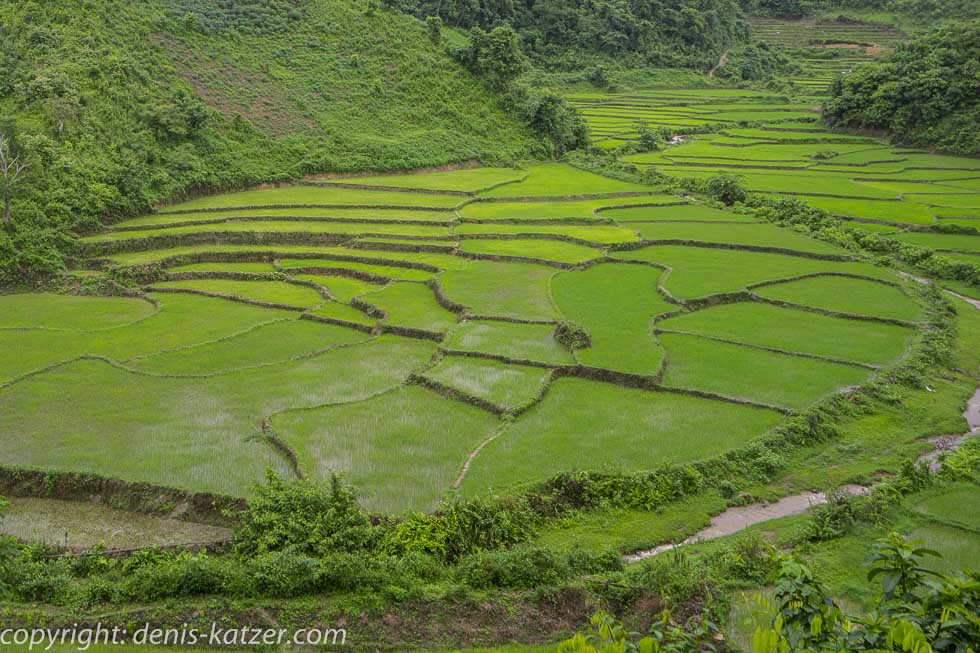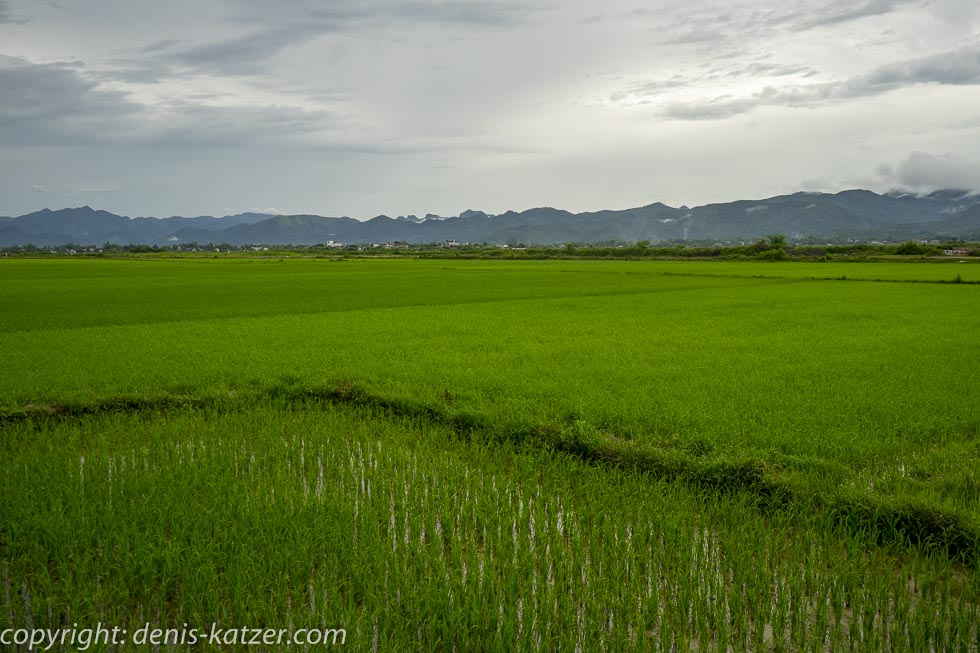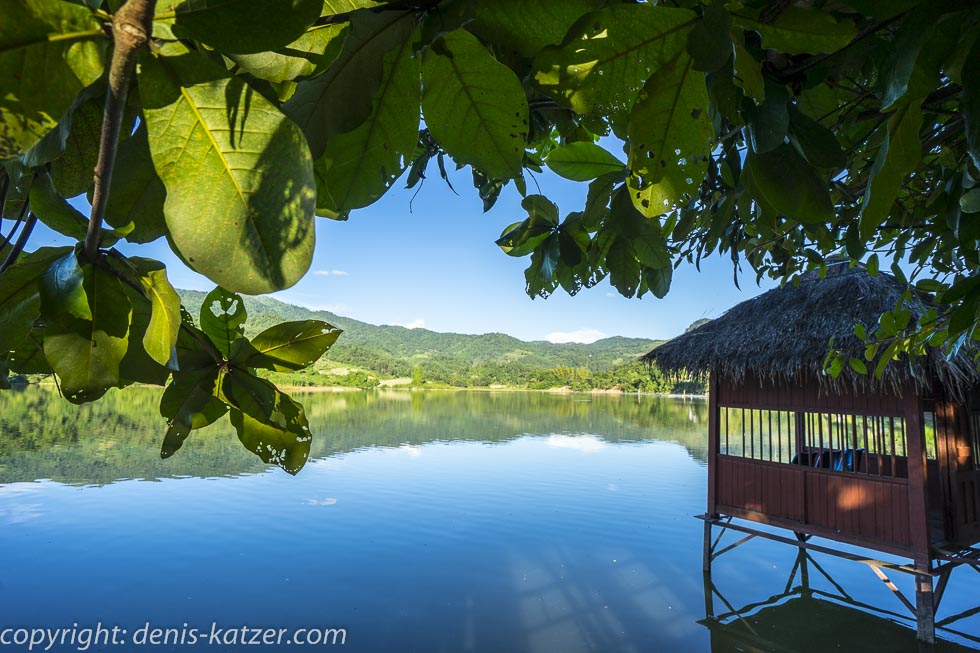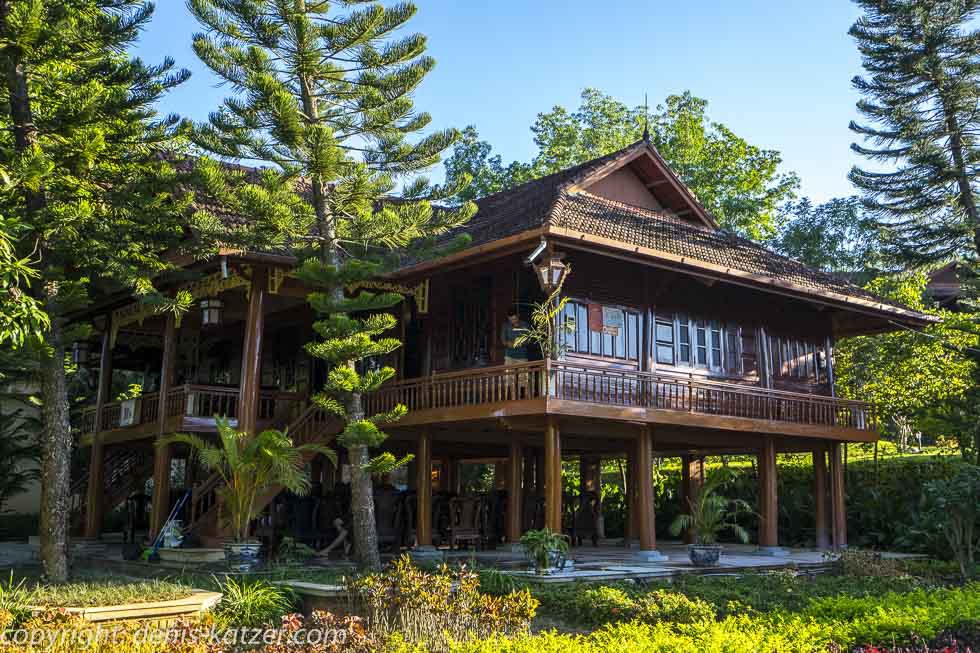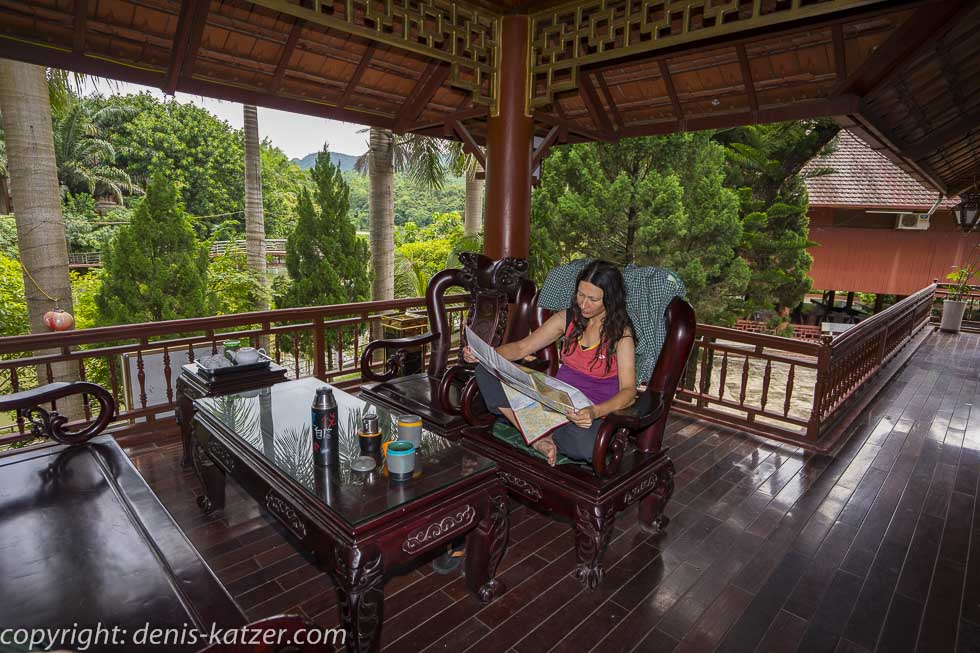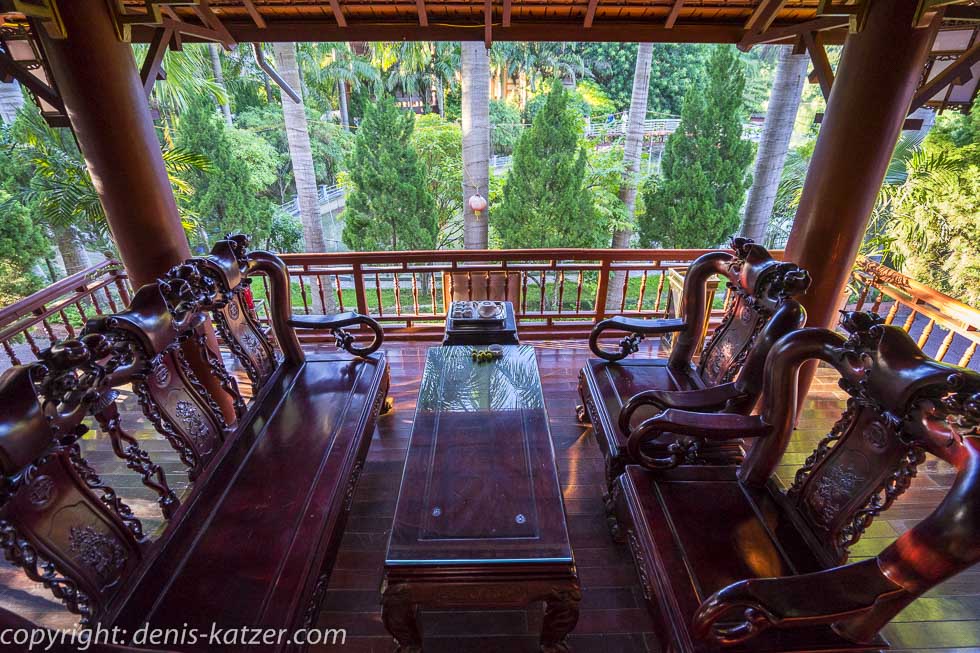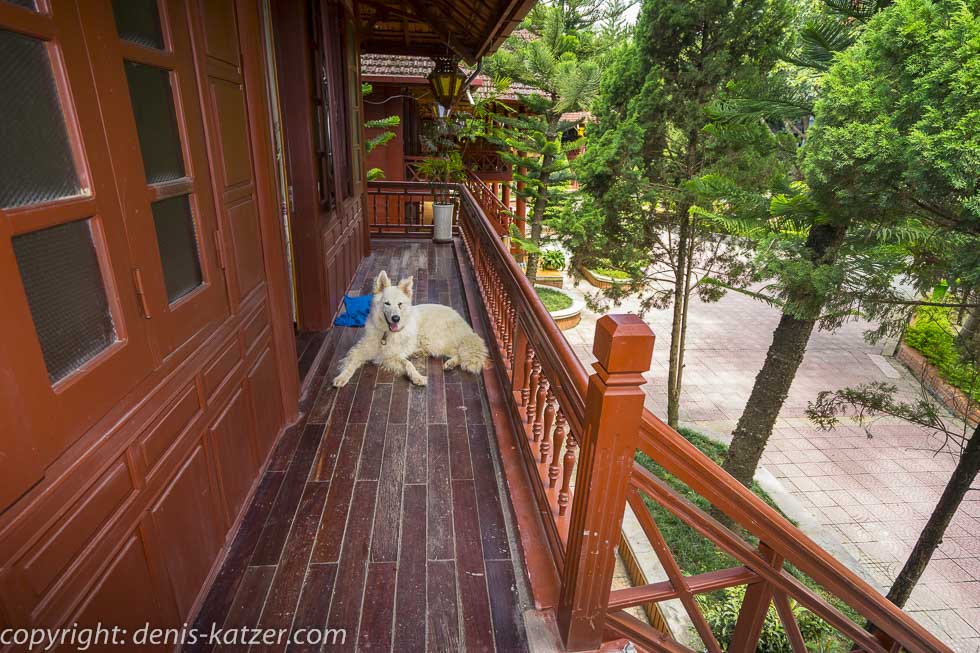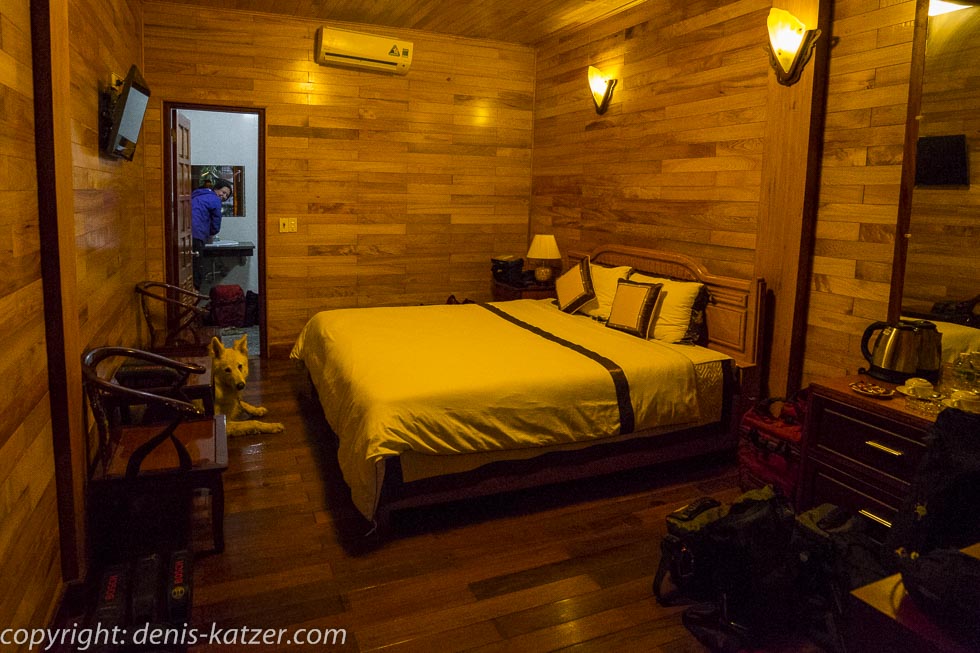
1,703 vertical meters, 118 daily kilometers, the consequences of plant toxins and much more
N 21°24'19.5'' E 103°02'37.0''
Date:
21.07.2016 until 22.07.2016
Day: 390 – 391
Country:
Vietnam
Province:
Điện Biên
Location:
Điện Biên Phủ
Latitude N:
21°24’19.5”
Longitude E:
103°02’37.0”
Daily kilometers:
118 km
Total kilometers:
17,765 km
As the crow flies:
74 km
Average speed:
16.8 km/h
Maximum speed:
54.7 km/h
Travel time:
6:06 hrs.
Soil condition:
Asphalt
Maximum height:
1.600 m
Total altitude meters:
50.306 m
Altitude meters for the day:
1.703 m
Sunrise:
05:36
Sunset:
6:51 pm
Temperature day max:
25°C
Temperature day min:
21°C
Departure:
09:00 a.m.
Arrival time:
6:00 pm
(Photos of the diary entry can be found at the end of the text).
After two days in our quirky, lonely and run-down mountain hotel, we set off again. We would have loved to stay longer, but even if you think you have plenty of time to get to know and travel around a country, as we did, it never seems to be enough. One of the reasons for this is the stupid visa regulations of each country. For Vietnam, we have a three-month stay for the time being. Almost two months have already passed since then. We have to hurry a little to collect our second passport, which we have had sent to the German Embassy in Hanoi with another three-month visa. The village of Mai Chau is about 350 km away over the mountains. I will stay there to write about our trip while Tanja takes the bus to Hanoi to pick up our passports from the embassy. Once we have the important documents, we cycle 400 km to the Vietnamese Laotian border to travel to Laos for a few weeks. Afterwards, we will return to Vietnam with the new three-month visa to continue our e-bike tour there. At least that’s the strategy. As we know that things often turn out differently than planned, we let ourselves be surprised.
Because it rained heavily during the night, as it almost always does, the steep one-kilometer driveway to the hotel is wet and sometimes slippery due to moss growth. Even pushing our heavy bike out of the facility turns out to be a dangerous undertaking. Just the slightest pull on the brake lever causes the front or rear tire to slip. The trailer pushes forward in such a way that it immediately turns sideways. “And how are we supposed to get down the mountain unscathed?” asks Tanja. “I’ll ride the bikes down one after the other,” I reply. “And you mean not slipping?” “I’ll be careful.” I carefully lift my right leg over the saddle, step onto the pedals and carefully let my bike roll downhill. I avoid the green, moss-covered areas and only try to brake where the road surface looks rough. A risky tactic, but one that seems to work. When the first bike and trailer are down, I run back up to get Tanja’s bike while she leads Ajaci down into the valley on a leash. Only once does my rear tire slip, but fortunately it recovers. I get the second bike train to the main road in one piece.
“Well done,” Tanja praises me, visibly relieved that I didn’t fall apart on this hellish ride. We cross the bridge over the Sông Đà again and continue our journey through the picturesque landscape. Today’s destination is the historic village of Điện Biên Phủ, not far from the Laotian border. In the wide valley of Điện Biên Phủ, the Vietnamese independence movement Việt Minh defeated the French troops, including their Foreign Legion, during the French Indochina War and thus won the war.
Because we are in a low-lying valley and have to cross another 1,600-metre-high pass, the mountain road winds steeply upwards again. The tropical rain alternates constantly with glistening sunshine. The humid heat is unbearable and whenever we get drenched to the skin in a heavy shower, we are happy to cool down. At the top of the pass, a farmer’s wife and her children sell fresh pineapples. After peeling, they wash their hands in one of the dirty puddles. We consider whether we can still dare to treat our starving bodies to the delicious tropical fruit. “Shall we go for it?” asks Tanja. “Hm, there’s fresh rainwater in the puddles. It’s not going to be a pool of bacteria,” I assume, which is why we buy a large bag of freshly peeled and sliced pineapple chunks for 10,000 dong (€0.40). “Mmm, delicious,” Tanja enthuses with a laugh. After filling our bellies, we continue our journey over the rainy mountains. The constant inclines make us sweat incessantly, so we have to quench our thirst with lots of water. I don’t know if it’s the combination of exertion, water and pineapple, but just 30 minutes later my stomach starts to rumble. From now on, every meter of altitude costs me a lot of energy. Especially when a cramp is making its way through my intestines. “You’re so slow! What’s wrong?” asks Tanja, sticking close to Ajaci’s trailer. “Tummy ache,” I reply. “Bad?” “I’m fine,” I say, hammering my legs into the pedals like two powerhouses. 10 minutes later, another cramp builds up. The pain is considerable and gets stronger from time to time. “Fucking pineapple!” I curse indignantly. “I’m fine,” I hear Tanja say behind me. “Maybe there were bacteria in the puddle after all,” I say. “Then I should feel bad too.” “Right, then my stomach is just rebelling against the water and pineapple combination,” I reply as another colicky pain rears up inside me. “Hmmmpf,” I say, trying to suppress the attack. Suddenly a strong wind comes up. The clouds racing over the mountain ridge in front of us don’t look good at all. The trees to the left and right of the road bend like blades of grass. A gust of wind hits me and moves my bike into the middle of the road. As there are no cars or mopeds coming towards you, this is not a problem. “We should put on our rain jackets!” I shout, pull the brakes, put the bike on the stand and pull my poncho out of the front right saddlebag. As I slip it on, the gates of heaven open. The torrents falling from the clouds are accompanied by a thunderstorm in my body. “Ohhhh,” I moan as the muscles in my stomach contract uncontrollably again. Then the journey continues. The road has turned into a river on which the water from the mountains rushes towards us. Tormented by the attacks of pain that now occur every few minutes, the torrential rain and the exertion, my eyes glide along the road. About a kilometer further on, I can dimly make out a wooden house standing on posts. “We can seek shelter from the storm there!” I shout to Tanja. As soon as we arrived at the house, the weather gods turned off the tap again. The storm has turned into a normal tropical downpour. As we are already soaked to the skin despite our rain gear, we decide to cycle on. A mistake, because just a few hundred meters further on, my stomach muscles contract as if someone were detonating a grenade in the middle of my body. “Ahhhh!” I yell, yank the brake levers, jump off the bike as if struck by lightning, dash into the bushes and manage to rip off my cycling shorts at the very last second. The explosion is enormous and relieving at the same time. “Tanja! I need toilet paper!” I shout from the bushes. “Come on!” I hear her laugh. “There’s nothing to laugh about,” I complain, with the result that I have to endure another outburst of hilarity. 10 minutes later I’m back in the saddle. “No more pineapples whose peeling hands have been washed in a tropical rain puddle,” I say cheerfully, because this disaster could easily have gone down the drain.
Again and again we discover signs erected on the roadside warning of the consequences of pesticides. The images of deformed children with bulging eyes, deformed faces, heads and missing limbs are absolutely terrifying. In the rice fields, we constantly see farmers standing with their bare feet in the water, carrying a tank on their backs and spreading poison on the plants with a syringe in their hand. Only a few of the farmers have learned how to handle poison and know how much of it a crop can tolerate and what fatal consequences pesticides and over-fertilization have on themselves, their children and the entire population. We stand in front of the sign erected next to a facility where children suffering from plant poison are treated. “Are these poor children still victims of the Vietnam War today?” says Tanja, moved. “Surely they are not just victims of their current toxic spraying. From what I’ve read, the Vietnamese people are still suffering today from the terrible consequences of the defoliant used by the US military during the Vietnam War,” I say. “But why did the Americans commit such a terrible crime?” asks Tanja. “War has no laws. At least no nation abides by them during war. The Ministry of Defense probably thought they could bring their opponents to their knees with these attacks. They wanted to clear the Vietcong’s supply routes, which were overgrown by jungle, so that the enemy could no longer hide in them. At the same time, the plan was to permanently destroy their rice paddies and other food production. A terribly deadly tactic that did not work. If you consider that the Americans sprayed over 44 million liters of Agent Orange contaminated with a total of 300 kilograms of dioxin and a further 72 million liters of chlorinated herbicides over South Vietnam between 1961 and 1971, this action is one of the worst crimes ever committed by a belligerent country against its enemies. The terrible thing for me is that this unimaginable crime has still not been atoned for. Above all, according to the Vietnamese government, up to two to four million people are still suffering from the consequences of this fatal bioweapon, and the deformity rate of 100.000 children is three times higher than in neighboring countries, the soil in the affected areas is totally contaminated for generations to come, the nutrient balance and irrigation system has been damaged for generations, the animal world has been partially wiped out or destroyed and the entire national climate, including the climate of neighboring countries, has been changed by the fatal intervention in nature,” I say and feel how these facts hit me on the stomach again. We stand around for a while, trying to push the negative thoughts that have arisen to one side and continue our journey.
We reach a small village around midday. In a restaurant, we get two substantial meals with a large bowl of rice for 70,000 dong (€2.78). “Phew, I’m pretty exhausted,” I say tiredly after the meal. “Should we look for accommodation here?” asks Tanja. “If there’s anything, I think that’s a good idea,” I reply, whereupon we ask the waitress for a hotel. “There in front, the blue house,” she says in quite good English. When we arrive at the run-down blue house, we learn that Ajaci is not allowed in and has to spend the night tied up in the courtyard. Not a good idea in a country where people love dogs. Apart from that, our bikes are not allowed in the building, which has been worn down by the ravages of time and offers its guests not the slightest comfort apart from simple beds and a dumpy toilet in the corridor. “How far is it to Điện Biên Phủ”, asks Tanja. “Another 50 km,” I say. “Are you fit enough to get there today?” “Sure,” I reply. As soon as the village is behind us, we head back up again, accompanied by a rain shower.
It is 5:30 pm when our tires roll into the wide valley of Điện Biên Phủ. We are greeted by hectic activity. We ask about the resort we read about on the net. “They certainly don’t take dogs there,” I say doubtfully. “Maybe so,” says Tanja confidently. At 6 p.m., after 118 kilometers and 1,703 meters of elevation gain, we reach the tourist resort just outside the city, built directly on the shore of a small lake. We leave the large swimming pool on our right and stop in front of a modern, luxurious reception. “If they accept our dog, I’ll eat a broom”, I’m convinced I’ll be rejected. “Are you asking or should I?” says Tanja. “You,” I reply, because I’m not in the mood to be rebuffed just to have to drive back to the bustling little town after a busy day to continue our search for a place to stay for the night. While Tanja tries her luck in the lobby, I talk to a young Vietnamese man who is watching his husky play. “Dogs and bikes are no problem,” Tanja interrupts our conversation, beaming with joy. “Not true, is it?” “But true.” “Unbelievable. How did you convince her?” “I didn’t have to. They love dogs and even gave us their best luxury room at a special price of 600,000 dong (€23.78) including breakfast.” A friendly employee accompanies us to an elegant stilt house where our beautiful room is located. “Wow, who would have expected that after such a day,” I say happily. After carrying our saddlebags into the new accommodation and stowing the trailers on the balcony in front of it, we set off again to ride back into town. Here we withdraw money for the next few days from an ATM machine and buy nuts, water, a few beers and other little things. While Tanja disappears into a tiny store, I keep an eye on our bikes outside. Meanwhile, an aggressive dog circles around me and keeps trying to piss on one of the bikes. “How off!” I shout at him. Wow! Wow! Wow!” he barks back incessantly. The shopkeeper storms out armed with a broom and tries to chase the dog away. As soon as she has disappeared back into her store, the dog launches another attack. “Bloody hell! Now pull the leash!” I yell as he marks the front tire of Tanja’s bike. I storm angrily towards the four-legged friend. During his escape, he touches the front tire. Because the bike is on a slight slope, it suddenly takes on a life of its own, rolls forward a few centimeters and tips over the curb. It crashes onto the road with a loud thud. The entire contents of my handlebar bag smash onto the asphalt. “Oh no!” I shout, horrified to see the GoPro camera, the GPS and my smartphone crashing onto the road surface. I immediately pick everything up. The camera and GPS survived the hard landing without any damage. My smartphone, on the other hand, which I bought new after a pickpocketing in Ulan Bator, the capital of Mongolia, has a crack across the entire display. “What a mess,” I grumble. On the next ride to the next store, the mudguard grinds. While Tanja is busy shopping again, I repair the mudguard bracket. “If you’re left alone for just a few seconds,” Tanja scolds me jokingly. “It could have happened to you,” I defend myself. “Well, luckily nothing else has broken and your smartphone still works.”…
If you would like to find out more about our adventures, you can find our books under this link.
The live coverage is supported by the companies Gesat GmbH: www.gesat.com and roda computer GmbH http://roda-computer.com/ The satellite telephone Explorer 300 from Gesat and the rugged notebook Pegasus RP9 from Roda are the supporting pillars of the transmission.Pegasus RP9 from Roda are the supporting pillars of the transmission.
